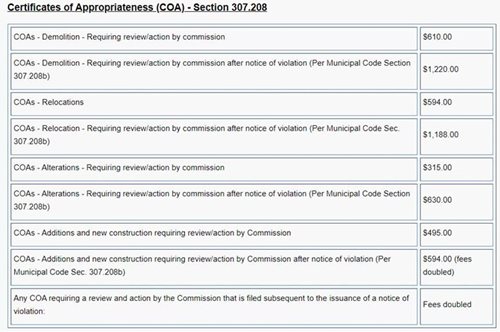How do I know if something is within a Historic District or a local Landmark?
You can search by address or real estate number to find out if a property is within a Historic District or a Landmark on the Land Development Map. At the top of the page open the Layers tab, expand the Historic list and check the boxes for "Historic Districts" and "Landmarks"; you can also download the Map Instructions.
What is a COA?
A Certificate of Appropriateness (COA) application is required for all properties within the Historic Districts as well as locally designated Landmarks. COAs must be submitted for any work done to the exterior of a building like repairing windows and siding, as well as site work like fencing, driveways and sheds. Once a COA is approved, it is valid for 1 year. After work has begun, the COA will be valid for 5 years.
How do I apply for a COA?
You can apply for a Certificate of Appropriateness (COA) by using our online portal LUZAP.
How can I improve my home's energy efficiency?
Historic homes lose energy through the foundation, walls, and attic spaces in addition to breaches in the exterior walls. Many improvements made to the interior of the home do not require a COA and can be very effective in reducing your energy bills. JEA offers Free Energy Efficiency Assessments to identify improvement areas that can increase your energy efficiencey. Energy efficiency improvements that do not affect the exterior of the structure do not require a COA.
What kind of work can I do without a COA?
Interior work that does not affect the exterior of the structure does not require a COA. If the interior work changes things like windows, exterior doors or other features like a chimney, you are required to file a COA before work begins.
What happens if I do work requiring a COA without getting an approved COA?
Any work initiated without an approved COA may receive a violation. Violations may recieve after-the-fact approval, approval with corrective actions, denial requiring full reversal, or denial with a settlement agreement. Violations that cannot be processed at the Administrative level must be heard by the Jacksonville Historic Preservation Commission (JHPC).
What is the Jacksonville Historic Preservation Commission (JHPC)?
The Jacksonville Historic Preservation Commission (JHPC) is a mayor-appointed body which meets once a month to review applications. Most JHPC meetings are on the 4th Wednesday of the month, with the exception of November and December.
How long does it take to have a COA processed?
Administrative COAs can take a week or two to process, sometimes sooner depending on the scope of work and time of year. For COAs that must be reviewed by JHPC, this takes a minimum of one month from application submittal to receiving the signed approval.
How will I know if my application needs to go to the JHPC?
After you submit your application, Staff will review the application’s scope of work. They will reach out via email to let you know if the application requires JHPC review or if changes are needed for administrative approval. Requests that must go the JHPC include, but are not limited to, demolition of contributing structures, new construction, 2-story garages, and 2-story additions.
When should I submit my application if it will need JHPC review?
Applications that require JHPC review should be submitted 6 weeks before the next meeting, around the 15th of the month before the meeting. This gives Staff time to ensure the application is sufficient and time for you to provide any additional information requested by staff prior to the deadline.
Is there a fee to go before the Jacksonville Historic Preservation Commission (JHPC)?
Yes, there is a fee to go before the JHPC that is based on the type of request in the application, see table below. Violation applications are for after-the-fact review of work already started, where the base application fee is doubled.

What is RAP and SPAR?
Riverside Avondale Preservation (RAP) and Springfield Preservation and Revitalization (SPAR) are non-profit neighborhood organizations not governed by the City of Jacksonville. These organizations serves as a liaison between neighborhood residents, businesses, and the city to ensure that their neighborhoods are preserved, promoted, and celebrated.
How do I find a contractor?
Contractor recommendations may be found by posting on the RAP and SPAR neighborhood Facebook groups or NextDoor. You can check a contractor's Licence status before hiring them through the Duval County Contractor Licenses Search and use the State Contractor Licenses Search to "View License Complaint" at the bottom of their Licensee Details page to view official complaints filed against a contractor.
What is the Historic Planning Section's hours of operation?
We are in office from 8:00am-5:00pm Monday-Friday and the lobby is open for walk-ins, no appointment required.